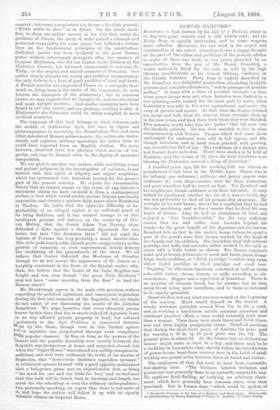MONARCHICAL AND REPUBLICAN ROME.*
WE have observed in this useful book some curious spellings of local and personal names which, being consistently adhered to, we must assume to have been deliberately adopted by the author, and, very probably, on just grounds, though to us and the majority of readers they must certainly appear strange, and even unprecedented. It is to be wished that our scholars and teachers would decide unanimously and ea: eatheclrd how the names of persons and places belonging to foreign lands or distant ages should be spelt and pronounced, or, if agreement is impossible, explain to us why the great Roman historian is to be designated by the girlish name of Livy, or why Teutonic Köln should be G-allicised and nicknamed Cologne. It is probable, however, that our author has had the sanction of the best manuscripts, at least if we may judge
from the successful labour he has bestowed on his work d. every other respect.
naich
Mr. Shuckburgh gives us a very fair and judicious ac- of the mysterious Catilinarian conspiracy, and we agree
him that the evidence against the culprits, even if mount sufficient, was not legally strong enough to secure theirith viation, and certainly not their capital punishment. Yet must be admitted that in troublous times a strict adherence to the letter of the law has led to much wrong to individuals and damage to the commonweal. Legal technicalities led to the immolation of Alice Lisle, and saved Thelwall, O'Connor, and Home Tooke from the merited scaffold. Had Catiline himself been captured after the defeat of Pistoria, he could have been legally and morally convicted of treason, having committed the overt and visible act of waging war against his * A History of Rome to the Battle of Actium. By E. B. 8hnokburgh, London ; Macmillan and Co. country; but secret conspirators are, to use a Scottish proverb, " Kittle cattle to shoe " or to detect. On the whole, there- fore, we deem our author correct in his view that, under the guidance of Cicero, the party of order gained a triumph and preserved tranquillity for some years, but inflicted a serious blow on the fundamental principles of the constitution. Sufficient justice has been rendered to the great Roman orator without extravagant panegyric after the manner of Conyers Middleton, who did not believe in the Fathers of the Christian Church, but laboured strenuously to canonise St. Tally ; or the carping and unjust censures of Drumann. Our author clearly discerns his vanity and political inconsistency, the only defects in a host of good qualities of head and heart. A French novelist has impeached Cicero as a renegade, inas- much as, being born in the ranks of the bourgeoisie, he soon became the champion of the aristocracy ; but in common justice we may suppose that he thought the noblesse the wisest and most upright patriots. And similar examples have been found in our own annals, and are, perhaps, existing to-day. A Dictionnaire des Girouettes could be easily compiled in most civilised countries.
The language of this book belongs to what Johnson calls the middle or Addisonian style, but rises to vigour and picturesqueness in narrating the Hannibalian War and some other episodes of Roman achievements; the author also under- stands and explains military operations far better than we could have expected from an English civilian. We have, however, observed some few phrases which savour of vul- garity, and may be deemed alien to the dignity of narrative composition.
We are glad to see that our author, while exhibiting sound and patient judgment in the investigation of evidence, is not tainted with that spirit of fidgetty and unjust scepticism which has tyrannised over historical inquiry for the greater part of the present century. He rejects the unreasonable theory that we cannot assent to the truth of any historical statement unless we have received it from a contemporary author, a view which would render ancient history practically impossible, and elevate a modern daily paper above Herodotus or Taoitus. He holds that the apparent difficulty or im- probability of an alleged exploit is no sufficient proof of its being fictitious, and it has seemed strange to us that intelligent persons will believe, on the authority of Citi- zen Motley, that the Dutch Adam Van Hareng alone defended a dyke against a thousand Spaniards for two hours, but that "the dauntless three" did not repel the legions of Porsena for, very probably, a much shorter time. Nor, as he judiciously adds, should poetic exaggerations or the growth of romantic or even supernatural details destroy the credibility of the groundwork of the story. We all believe that Cortez defeated the Mexicans at Otumba, though we do not accept the appearance of St. James as a knightly combatant in the front of the Spanish ranks ; why, then, not believe that the battle of the Lake Regillus was fought and won even though "the great Twin Brethren" may not have " come spurring from the East" to lead the Roman onset P Mr. Shuck burgh agrees in the main with previous 'writers regarding the political agitations and consequent legislation during the first two centuries of the Republic, but our limits do not admit of our discussing the merits of the Licinian Rogations. We hope, however, that every educated person knows by this time that the so-much-talked-of Agrarian Laws in no way affected private property in land, but referred `exclusively to the Ayer Publicus, or conquered districts *1■sld by the State, though even in this limited sphere b„mli injustice was perpetrated through weak compliance "ailih popular clamour. In fine, as long as the powers of the `Senate and the popular Assembly were equally balanced, the Republic was prosperous at home and respected abroad, but when the "Upper House" was reduced to a nullity, conspiracies, seditious, and civil wars evidenced the truth of the maxim of Sophooles, that " democratic insolence engenders tyranny." A celebrated epicure blessed with a good appetite maintained that a full-grown goose was an objectionable dish, as being "too much for one and too little for two," and we feel-sure that this book will be found, both in learning and length, too much for the schoolboy or even the ordinary undergraduate ; bat, personally speaking, we regret that there is not more of it, and hope the author will follow it up with an equally valuable -volume on Imperial Rome.



































 Previous page
Previous page